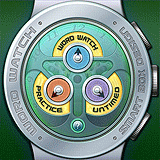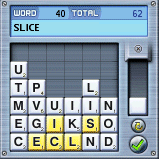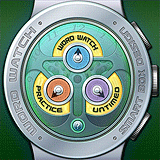Word Watch is a new game by Smart Box Design that was released t oday, July 28, 2005. But how did it come about? Jim and I almost a year ago were playing with Scrabble tiles trying to invent a new word game. Ted has expressed an interest in an anagram game and Jim and I thought we could make one that would be in line with Smart Box Design’s philosophy. All our games have several elements of strategy and thinking skills.
oday, July 28, 2005. But how did it come about? Jim and I almost a year ago were playing with Scrabble tiles trying to invent a new word game. Ted has expressed an interest in an anagram game and Jim and I thought we could make one that would be in line with Smart Box Design’s philosophy. All our games have several elements of strategy and thinking skills.
Jim lined up some tiles and made a word. Then for fun he mixed up seven letter tiles and challenged me to make a word he was thinking of. I couldn’t. But I did make a shorter word using five of the tiles. I slid the remaining two tiles toward me to move them out of the way. Jim then slid over some more tiles and challenged me again to make a word. I was successful this time. Then at the same time, we both noticed that the word just made could be extended by adding the two tiles I had previously pulled down. The light bulb went off. And the result was Word Watch.
Word Watch is the only anagram game that I know of, where you can still be successfully even if you don’t always know the word. In Word Watch if you can’t make the full length word your longest made word is evaluated and any remaining letters become penalty tiles. Then a new round starts with a new word. If you can solve that word you are rewarded with a bonus round. If you can make a new word with the penalty tiles and the letters of the word you just solved, then the used penalty tiles are removed. All this happens while the Word Watch timer is winding down.
Give Word Watch a try and let me know what you think of it.




